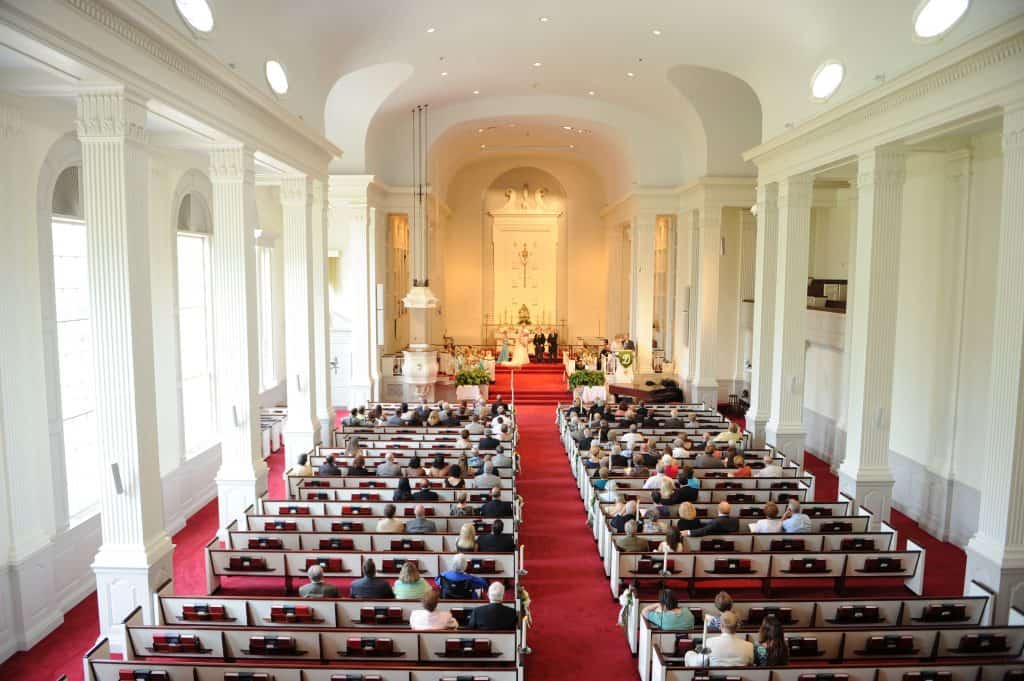

In response to a growing swell of the faithful in the Western Hemisphere who are pushing to embrace the LGBTQI community and of clergy who wish to perform same-sex marriages in accordance with federal law, the Methodist Church is undergoing a period of upheaval in terms of doctrine vs. spirituality, a clash between the letter of canon law and the teachings of Jesus.
At Haddonfield United Methodist Church, the Rev. Chris Heckert is confident on which side of the argument he’ll stand to offer the best council to his flock.
“I’m committed to working for change in my denomination however I can. My primary commitment is to pastor all people to care for all people within this church. That means having good dialogue and not discriminating in how I offer care to people,” he said.
“At this place and time, there’s no place I’d rather be than this church because we’re not talking about ‘those people out there’ when we talk about the LGBTQI community, we talk about part of our body here. I’m committed to building a bridge and demonstrating how it can be done on a deeper level.”
As explained on the UMC’s website, The Methodist Church’s Book of Discipline, which is updated every four years during what is known as the General Conference, recognizes the “sacred worth” of all persons but also states “the practice of homosexuality is incompatible with Christian teaching.” It also bans clergy from performing same-sex weddings, and prevents all Methodist buildings from hosting a same-sex ceremony. The church officially does not ordain open and practicing homosexuals and forbids financial support of LGBTQ-based groups.
“There is the church in America, but then there are the churches in the rest of the world: in Europe, Africa. Getting consensus is very challenging because you’re dealing with different cultures, different countries, different languages. And so every four years, our governing book is edited, and is up for reconsideration through a legislative process,” Heckert stated.
“What has happened, over the last several decades, is the church has shrunk in North America and has grown in other parts of the world. It kind of works like the (U.S.) House of Representatives: the greater the population, the greater the representation. Which means, as the population of Methodists in North America and Europe has shrunk, the representation in other parts of the world has grown. So it has made it a little more of a challenge to negotiate who we are and what we stand for.”
Heckert said the primary obstacle from which all discussion originates, is that, in 1972, language was placed in the Book of Discipline regarding homosexuality and its opposition to Christian thought.
“That’s a key phrase Methodists have tried to edit out and change. It’s gotten closer and closer to a majority of being changed. However, in 2016, with the representation balance, as same-sex weddings became legal in the United States and hearts and minds were changing, we found our representation had shrunk. We found it’s a global conversation, and though stances here have changed and evolved, world-wide it has not necessarily,” he added.
At that special conference this past February, Heckert said, three plans were proposed: the “Connectional Plan,” which would have required massive changes to the church’s constitution, the “One Church Plan,” which would have aligned Methodists with Presbyterian/Lutheran brethren in allowing individual churches to decide if they will open up to gay marriage, and a “Traditionalist Plan,” which not only preserved existing language, but also required more punitive measures against those who break the rules.
Delegates approved the “Traditionalist Plan,” which affirmed the 1972 dictum. Ministers who perform same-sex weddings now face a minimum one-year suspension without pay for the first wedding, and permanent removal from ministry for the second.
Heckert also discussed how he recently read an article that likened the acceptance of the Traditionalist Plan to the fallout in the United Kingdom for its “Brexit” from the European Union. Although the rules were laid down, he related, everyone’s trying to get out of it, and while no pastors want to sign off on denying that moral and legal right, they’re also not willing to defy the law and risk their ministry.
According to the church site, transgender ministers have served United Methodist churches, and there is no policy excluding them from ordination. An attempt to deny ordination to transgender persons failed at the General Conference in 2008. Women have been ordained in the Methodist Church since 1956.
“My heart really breaks for the fact that our church … makes news for a global familial dispute. Our dirty laundry makes the headlines, and the good news and good work does not. It impacts LGBTQI people who feel persecuted and damaged, again,” Heckert continued.
“This church has always been what I call a ‘big tent church.’ This is already a place that models how to live with diversity in opinion and theology and politics. I feel committed to pastor all people in this church. I think there is a desire to let people know that all are welcome in this place. We have a significant population of LGBTQI community here. Not everyone agrees with it and not everyone agrees with that approach, but the church is large enough and strong enough in its commitment that I believe we can co-exist.”









